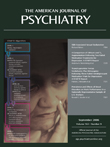Increased Stress-Induced Inflammatory Responses in Male Patients With Major Depression and Increased Early Life Stress
Abstract
Objective: The authors sought to determine innate immune system activation following psychosocial stress in patients with major depression and increased early life stress. Method: Plasma interleukin (IL)-6, lymphocyte subsets, and DNA binding of nuclear factor (NF)-kB in peripheral blood mononuclear cells were compared in medically healthy male subjects with current major depression and increased early life stress (N=14) versus nondepressed male comparison subjects (N=14) before and after completion of the Trier Social Stress Test. Results: Trier Social Stress Test-induced increases in IL-6 and NF-κB DNA-binding were greater in major depression patients with increased early life stress and independently correlated with depression severity, but not early life stress. Natural killer (NK) cell percentages also increased following stress. However, there were no differences between groups and no correlation between NK cell percentage and stress-induced NF-κB DNA-binding or IL-6. Conclusions: Male major depression patients with increased early life stress exhibit enhanced inflammatory responsiveness to psychosocial stress, providing preliminary indication of a link between major depression, early life stress and adverse health outcomes in diseases associated with inflammation.



